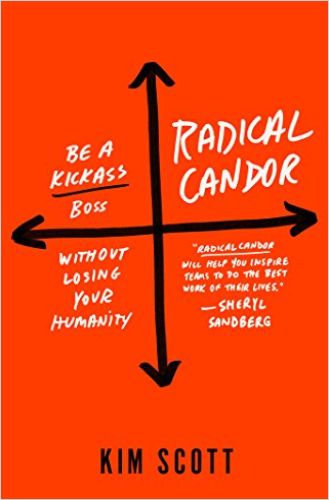Multifaceted best-selling author and executive coach Kim Scott offers a detailed manual for leaders who want to establish functional emotional connections with their employees.

Be Human
Executive coach Kim Scott, co-founder and CEO of Candor Inc., previously headed teams at Google, taught at Apple University, co-founded Juice Software, and was a CEO coach at Dropbox, Qualtrics, Twitter and other tech firms. She also, incongruously, authored the best-selling novel, Virtual Love.
In Radical Candor, Scott describes how she vowed not to make the same mistakes that an aggressive, demeaning boss made with her. She admits that as a new leader she didn’t know how to speak candidly to employees when their work wasn’t up to par and still foster a positive workforce culture. Her learning curve toward a gentle candor serves as the bedrock lesson of her book.
Renowned authors Shona Brown, Rachel Hollis, Jeff Kinney, Daniel Pink, Sheryl Sandberg and Gretchen Rubin all recommend Scott’s multiyear New York Times and Wall Street Journal bestseller which was translated into 20 languages and sold over half a million copies.
Scott is clear that offering employees empathy without requiring accountability from them is inauthentic. That ties into her advice to hire the right people promptly and compassionately fire those who need to go.
Be a Better Boss
Scott believes bosses should provide guidance, build cohesive teams, get things done and establish trusting relationships with the people who work for them. She details with admiration how managers at Google and Apple are instructed to emphasize caring, listening, understanding and facilitating healthy debate. Their strategies include empowering people to make decisions, explaining the reasons behind directions and committing to continuous learning.
Your ability to build trusting, human connections with the people who report directly to you will determine the quality of everything that follows.Kim Scott
Scott teaches that trust-based relationships built on radical candor have two aspects: “care personally” and “challenge directly.” She notes perceptively that traditional leadership methods focus unemotionally on the task at hand. Instead of following that practice, she urges you to care – to acknowledge your team members’ personal lives, interests, hopes and dreams outside of work.
Addressing her themes head on, Scott explains how the second dimension of radical candor – challenging directly – helps build strong relationships. To challenge directly, you should identify what’s not working for an employee, acknowledge it and address it forthrightly.
At the same time, she advises, encourage others to point out your mistakes and suggest improvements. When you ask for a critique, the author tells you, embrace the feedback. Listen intently without responding. Scott offers familiar advice when she says to thank the person who gives you feedback and to show humility when giving and receiving criticism.
“Rock Stars”
Apple values rock stars – team members who excel in their present jobs – as much as it does superstars who rise quickly through the ranks. Scott offers a lesson based on that example: Leaders should focus on growth management instead of traditional talent management by considering their employees’ preferred career development trajectories.
It’s absolutely within your power to build a team that looks forward to coming to work every day.Kim Scott
To manage rock stars, Scott urges you to shed any bias in favor of ambition. She recommends making people who consistently deliver great results happy by giving them the respect and recognition they deserve. At the same time, keep your superstars happy, as well, by providing them with mentors and having their next role, their shot at advancement, at the ready.
Get Stuff Done
Scott reminds you not to sacrifice employee well-being to hit a work target. The author’s Get Stuff Done (GSD) process facilitates productivity while ensuring that team members collaborate efficiently. To get stuff done, Scott believes managers must listen, clarify their ideas, debate the fine points of an idea before moving forward, decide on the next course with their team, persuade those who have to execute that course that it’s the right one, execute with team support, and learn from any initiative’s success or failure.
Trust
Scott fosters trusting relationships rather than exercising authority. She acknowledges what people feel, asks questions and resists the urge to tell people what to do. To give feedback, she advocates first describing how you observed the person react, and then explaining the effect of his or her behavior. Give praise or criticism quickly. She insists that you shouldn’t listen when someone complains about a co-worker, though perhaps that advice should be tempered with obvious caveats, such as in cases of harassment.
A strong leader has the humility to listen, the confidence to challenge, and the wisdom to know when to quit arguing and get on board.Kim Scott
Scott urges you to use one-on-one conversations to learn about employees’ goals and help them devise tailored career paths. The author suggests having people write out three to five dreams they have for the future and then fill in the skills they’ll need to realize each one.
Hard-Earned, Kind Wisdom
Scott’s suggestions are, for the most part, not new, and some are now aspects of contemporary mainstream thought. What sets her book apart is the clarity and compassion of her presentation. Perhaps her work as a fiction writer grants her more insight into human character than most business authors attain. Scott’s style is easy to read, and her main points are easy to retain. She writes for men and women, however, those who are new bosses or newly promoted will most appreciate her step-by-step advice for creating a supportive workplace.
Kim Scott’s other books include Just Work and The Househusband. Parallel works dealing with the need for leaders to embrace emotional candor include Brené Brown’s Dare to Lead and Simon Sinek’s Start with Why.













